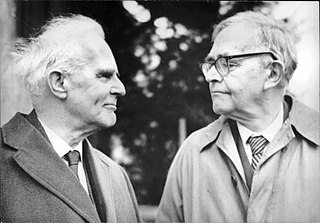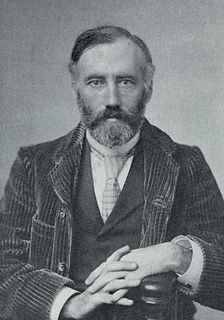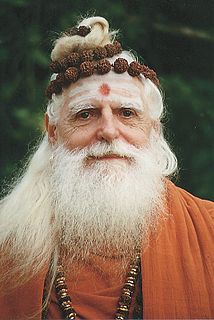A Quote by Swami Vivekananda
The three essentials of Hinduism are belief in God, in the Vedas as revelation, in the doctrine of Karma and transmigration.
Quote Topics
Related Quotes
One major difference between Mormons and evangelicals on the subject of revelation is that Latter-day Saints believe that God has appointed modern-day prophets and apostles to receive revelation for Christ's church. All church members may receive revelation appropriate for their particular callings or positions within the church and their families, but never in contradiction to church doctrine or policy. So Mormonism has both a democratic practice of revelation that would resonate with evangelicals, but also an institutional understanding of revelation foreign to evangelicalism.
...[sacred] doctrine is especially based upon arguments from authority, inasmuch as its principles are obtained by revelation: thus we ought to believe on the authority of those to whom the revelation has been made. Nor does this take away from the dignity of this doctrine, for although the argument from authority based on human reason is the weakest, yet the argument from authority based on divine revelation is the strongest.
The human understanding is a revelation from its maker, which can never be disputed or doubted. There can be no scepticism, Pyrrhonism, or incredulity or infidelity here. No prophecies, no miracles are necessary to prove this celestical communication. This revelation has made it certain that two and one make three, and that one is not three nor can three be one. We can never be so certain of any prophecy, or the fulfilment of any prophecy, or of any miracle, or the design of any miracle, as we are from the revelation of nature, that is, nature's God, that two and two are equal to four.
There is good Karma, there is bad Karma, and as the wheel of life moves on, old Karma is exhausted and again fresh Karma is accumulated... Karma is twofold, hidden and manifest, Karma is the man that is, Karma is his action. True that each action is a cause from which evolves the countless ramifications of effect in time and space... To the worldy man Karma is a stern Nemesis, to the spiritual man Karma unfolds itself in harmony with his highest aspirations.
In India the mother is the center of the family and our highest ideal. She is to us the representative of God, as God is the mother of the universe. It was a female sage who first found the unity of God, and laid down this doctrine in one of the first hy mns of the Vedas. Our God is both personal and absolute, the absolute is male, the personal, female. And thus it comes that we now say: 'The first manifestation of God is the hand that rocks the cradle'.
We're importing Hinduism into America. The whole thought of your karma, of meditation, of the fact that there's no end of life and there's this endless wheel of life, this is all Hinduism. Chanting too. Many of those chants are to Hindu Gods — Vishnu, Hare Krishna. The origin of it is all demonic. We can't let that stuff come into America. We've got the best defense, if you will — a good offense.
Karma is not fate, for man acts with free will, creating his own destiny. The Vedas tell us, if we sow goodness, we will reap goodness; if we sow evil, we will reap evil. Karma refers to the totality of our actions and their concomitant reactions in this and previous lives, all of which determines our future.



































